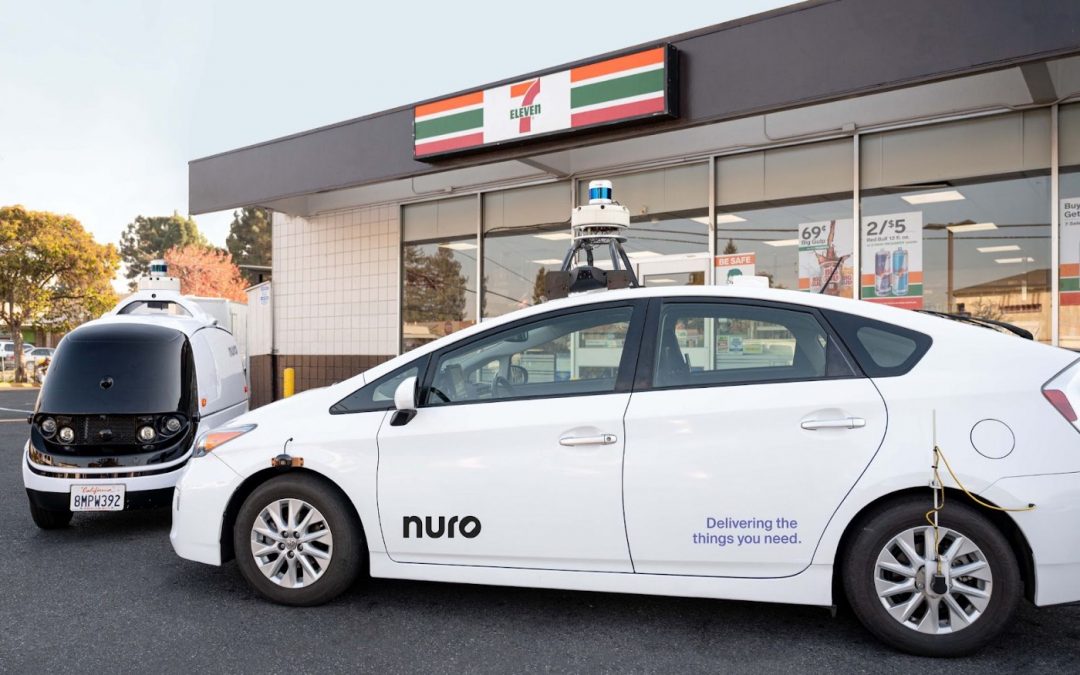You may remember promises of imminent self-driving from the mid-2010s when futurists claimed fleets of robotaxis would soon fill the streets and urban planners got high on the idea of tearing down parking garages. We now know this future isn’t right around the corner, regardless of what Elon says, but we’re still closer to fully autonomous vehicles than ever before.
Food delivery is a natural fit for the technology, and the sector’s intra-COVID growth spurt made the opportunity clear. Here are some of the companies that tested self-driving deliveries during the past year:
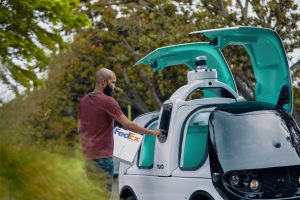
Nuro’s R2. The company is working on the next generation delivery bot, the R3, which it says will be the company’s first mass market vehicle.
Nuro
Nuro, a Mountain View, California-based technology company, has taken a two-pronged approach to its delivery partnerships. The programs, such as its partnership with Domino’s, typically begin by making deliveries with manned Priuses outfitted with self-driving technology and introduce the firm’s wholly-unmanned delivery bots over time.
Nuro’s newest delivery bot, the R2, is smaller than the average car but is still designed to travel on public roads. Per reporting from The Verge, the R2 is street legal in California at speeds of up to 25 mph and is limited to operating in fair weather conditions on roads with speed limits of 35 mph or less. The bots feature a pair of cargo bays, each opened with a PIN to keep cargo safe.
Nuro continued partnerships with Domino’s and Kroger in 2021, fulfilling deliveries in “select ZIP codes” in the Houston area, according to a press release. Earlier this month, the company announced a partnership with 7-Eleven to make autonomous deliveries in Mountain View, California.
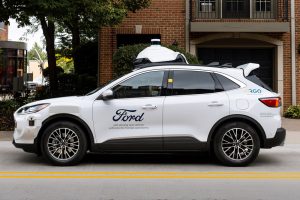
Argo’s robotaxis will begin deliveries in early 2022.
Per Crunchbase, the company has raised $1.5 billion since its inception in 2016, and it counts Kroger and Chipotle as investors.
Although Chipotle has yet to disclose a delivery partnership with the self-driving firm, Jack Hartung, the QSR chain’s chief financial officer, told Cheddar that he expects self-driving technology will mature “within probably a five-year time frame.”
Argo AI
Argo AI, a self-driving technology firm with deep ties to Ford and Volkswagen, is getting into the delivery game after years of robotaxi trials. In September, the firm announced a partnership with Walmart to make semi-autonomous grocery deliveries with Ford SUVs outfitted with self-driving technology. Per The Verge, the delivery vehicles will be manned.
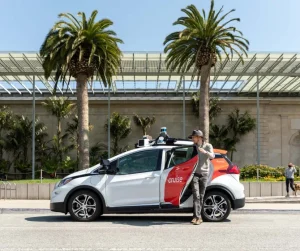
Cruise’s first-generation autonomous vehicle.
Cruise
A subsidiary of General Motors, self-driving technology firm Cruise stepped into the delivery game with a partnership with Walmart to fulfill deliveries out of a single Walmart store in Scottsdale, Arizona. Per Motor Authority, the deliveries are made by Chevrolet Bolts equipped with self-driving technology and sensors, but the company is working on a new, purpose-built vehicle for autonomous rideshare and delivery.
Cruise is one of a handful of companies licensed by California (where much of the self-driving action is happening) to conduct commercial self-driving tests. Cruise vehicles are permitted to travel on public roads between 10 pm and 6 pm at speeds of 30mph or less. The company previously announced a partnership to test deliveries in select parts of San Francisco.
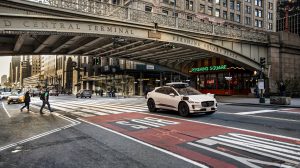
Waymo’s robotaxi in action in New York City.
Waymo
Alphabet-subsidiary Waymo is also authorized to conduct commercial tests, although its vehicles are permitted to go as fast as 65 mph in parts of San Francisco and San Mateo counties. The company tested cargo delivery with several logistics firms in Phoenix and recently announced a partnership with Albertsons to test grocery delivery in San Francisco.
Per Fortune, the delivery test is planned for early 2022, and, at least initially, will only be available to employees of Google and Safeway (owned by Albertsons).
Motional
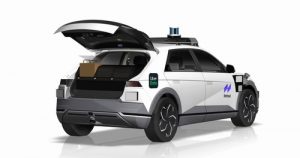
Motional’s all-electric vehicles will conduct deliveries with Uber Eats.
Motional, a self-driving technology firm backed by Hyundai, has been ferrying rideshare passengers around parts of Las Vegas since 2018. Earlier this month, the company announced a partnership with Uber Eats to use its robotaxis to make deliveries in Santa Monica, California, starting in early 2022. In a statement, Motional CEO Karl Iagnemma cited the massive growth of the delivery sector as a reason for the move.
A seeming drawback of using self-driving vehicles to make deliveries is the lack of a driver to make a door-front drop-off. But according to Cosmo Leipold, head of partnerships for Nuro, that hasn’t been an issue. In an interview with Business Insider, he said “I have been shocked … by just how much people are thrilled with the fact that they don’t have to interact with humans.” The absence of a driver is part of a permission structure that encourages customers to retrieve their orders themselves. Nevertheless, the company has said that their autonomous delivery model works best in areas with a lot of single-family homes, where it’s easy for the customer to identify where they want the delivery bot to go and easy for the bot to find that spot.
Nuro is a clear leader in the self-driving delivery sector, in terms of the number of partnerships, if nothing else. The company’s decision to use a purpose-designed delivery bot, rather than a retrofitted car, offers a glimpse into the future of autonomous delivery.

